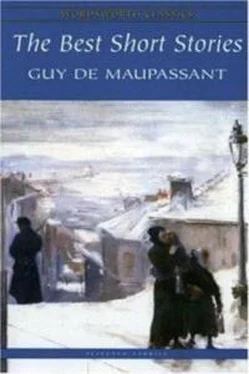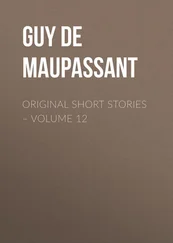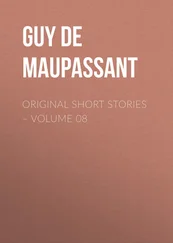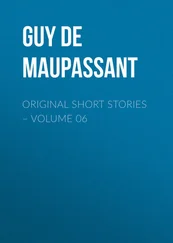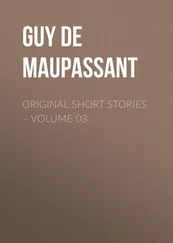"She got out at Saint–Cloud, and I followed her. She went and delivered her parcel, and when she returned the boat had just started. I walked by her side, and the warmth of the 'air made us both sigh. 'It would be very nice in the woods,' I said. 'Indeed, it would!' she replied. 'Shall we go there for a walk, mademoiselie?'
"She gave me a quick upward look, as if to see exactly what I was like, and then, after a little hesitation, she accepted my proposal, and soon we were there, walking side by side. Under the foliage, which was still rather scanty, the tall, thick, bright green grass was inundated by the sun, and the air was full of insects that were also making love to one another, and birds were singing in all directions. My companion began to jump and to run, intoxicated by the air and the smell of the country, and I ran and jumped, following her example. How silly we are at times, monsieur!
"Then she sang unrestrainedly a thousand things, opera airs and the song of Musette! The song of Musette! How poetical it seemed to me, then! I almost cried over it. Ah! Those silly songs make us lose our heads; and, believe me, never marry a woman who sings in the country, especially if she sings the song of Musette!
"She soon grew tired, and sat down on a grassy slope, and I sat at her feet and took her hands, her little hands, that were so marked with the needle, and that filled me with emotion. I said to myself:
"'These are the sacred marks of toil.' Oh! monsieur, do you know what those sacred marks of toil mean? They mean all the gossip of the workroom, the whispered scandal, the mind soiled by all the filth that is talked; they mean lost chastity, foolish chatter, all the wretchedness of their everyday life, all the narrowness of ideas which belongs to women of the lower orders, combined to their fullest extent in the girl whose fingers bear the sacred marks of toil.
"Then we looked into each other's eyes for a long while. Oh! what power a woman's eye has! How it agitates us, how it invades our very being, takes possession of us, and dominates us! How profound it seems, how full of infinite promises! People call that looking into each other's souls! Oh! monsieur, what humbug! If we could see into each other's souls, we should be more careful of what we did. However, I was captivated and was crazy about her and tried to take her into my arms, but she said: 'Paws off!'. Then I knelt down and opened my heart to her and poured out all the affection that was suffocating me. She seemed surprised at my change of manner and gave me a sidelong glance, as if to say, 'Ah! so that is the way women make a fool of you, old fellow! Very well, we will see.'
"In love, monsieur, we are always novices, and women artful dealers.
"No doubt I could have had her, and I saw my own stupidity later, but what I wanted was not a woman's person, it was love, it was the ideal. I was sentimental, when I ought to have been using my time to a better purpose.
"As soon as she had had enough of my declarations of affection, she got up, and we returned to Saint–Cloud, and I did not leave her until we got to Paris; but she had looked so sad as we were returning, that at last I asked her what was the matter. 'I am thinking,' she replied, 'that this has been one of those days of which we have but few in life.' My heart beat so that it felt as if it would break my ribs.
"I saw her on the following Sunday, and the next Sunday, and every Sunday. I took her to Bougival, Saint–Germain, Maisons–Lafitte, Poissy; to every suburban resort of lovers.
"The little jade, in turn, pretended to love me, until, at last, I altogether lost my head, and three months later I married her.
"What can you expect, monsieur, when a man is a clerk, living alone, without any relations, or any one to advise him? One says to one's self: 'How sweet life would be with a wife!'
"And so one gets married and she calls you names from morning till night, understands nothing, knows nothing, chatters continually, sings the song of Musette at the, top of her voice (oh! that song of Musette, how tired one gets of it!); quarrels with the charcoal dealer, tells the janitor all her domestic details, confides all the secrets of her bedroom to the neighbor's servant, discusses her husband with the tradespeople and has her head so stuffed with stupid stories, with idiotic superstitions, with extraordinary ideas and monstrous prejudices, that I—for what I have said applies more particularly to myself—shed tears of discouragement every time I talk to her."
He stopped, as he was rather out of breath and very much moved, and I looked at him, for I felt pity for this poor, artless devil, and I was just going to give him some sort of answer, when the boat stopped. We were at Saint–Cloud.
The little woman who had so taken my fancy rose from her seat in order to land. She passed close to me, and gave me a sidelong glance and a furtive smile, one of those smiles that drive you wild. Then she jumped on the landing–stage. I sprang forward to follow her, but my neighbor laid hold of my arm. I shook myself loose, however, whereupon he seized the skirt of my coat and pulled me back, exclaiming: "You shall not go! you shall not go!" in such a loud voice that everybody turned round and laughed, and I remained standing motionless and furious, but without venturing to face scandal and ridicule, and the steamboat started.
The little woman on the landing–stage looked at me as I went off with an air of disappointment, while my persecutor rubbed his hands and whispered to me:
"You must acknowledge that I have done you a great service."
Mattre Saval, notary at Vernon, was passionately fond of music. Although still young he was already bald; he was always carefully shaven, was somewhat corpulent as was suitable, and wore a gold pince–nez instead of spectacles. He was active, gallant and cheerful and was considered quite an artist in Vernon. He played the piano and the violin, and gave musicals where the new operas were interpreted.
He had even what is called a bit of a voice; nothing but a bit, very little bit of a voice; but he managed it with so much taste that cries of "Bravo!" "Exquisite!" "Surprising!" "Adorable!" issued from every throat as soon as he had murmured the last note.
He subscribed to a music publishing house in Paris, and they sent him the latest music, and from time to time he sent invitations after this fashion to the elite of the town:
"You are invited to be present on Monday evening at the house of M. Saval, notary, Vernon, at the first rendering of 'Sais.'"
A few officers, gifted with good voices, formed the chorus. Two or three lady amateurs also sang. The notary filled the part of leader of the orchestra with so much correctness that the bandmaster of the 190th regiment of the line said of him, one day, at the Cafe de l'Europe.
"Oh! M. Saval is a master. It is a great pity that he did not adopt the career of an artist."
When his name was mentioned in a drawing–room, there was always somebody found to declare: "He is not an amateur; he is an artist, a genuine artist."
And two or three persons repeated, in a tone of profound conviction:
"Oh! yes, a genuine artist," laying particular stress on the word "genuine."
Every time that a new work was interpreted at a big Parisian theatre M. Saval paid a visit to the capital.
Now, last year, according to his custom, he went to hear Henri VIII. He then took the express which arrives in Paris at 4:30 P.M., intending to return by the 12:35 A.M. train, so as not to have to sleep at a hotel. He had put on evening dress, a black coat and white tie, which he concealed under his overcoat with the collar turned up.
As soon as he set foot on the Rue d'Amsterdam, he felt himself in quite jovial mood. He said to himself:
Читать дальше
